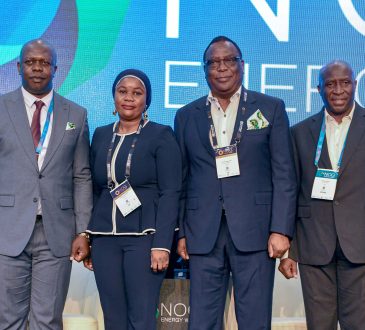
By Wole Tokede
As part of efforts at fulfilling its electioneering campaign promises, Lagos State Chapter of the Institute of Chartered Secretaries and Administrators of Nigeria (ICSAN) held its maiden Business Meeting and Members Forum in Lagos on Thursday. In her welcome address, Chairman of the Chapter, Mrs. Abiola Laseinde thanked members and sponsors for their unalloyed support.
According to her, “I wish to state categorically that the focus of this current administration, as we continue to build on the legacies of our ‘heroes past’, is to deploy resources in moving the Chapter forward. As emphasized in my inaugural speech at the investiture, we will focus on four crucial strategic points: our Growth, our Visibility, our Relevance and Integration with the goals and objectives of ICSAN National.
“At the EXCO level, we have agreed that majority of our activities as a Chapter will be more ‘member-centric’ in approach. This stance informed the choice of the theme of today’s meeting– ‘Harnessing your values as a Chartered Secretary and Administrator’, a topic which will be given full expository by our distinguished Keynote Speaker and discussants. Our Business Meeting is a veritable platform for members to interact, network and create great relationships and opportunities as part of our OWN FAMILY TIME.
“Exciting times are ahead as I’m pleased to inform you that as part of our strategies to drive members’ engagement and participation, for the first time in the history of the Chapter, we have expanded our EXCO units for members to join us in service. Hence, members can join the following committees of EXCO: Publicity, Mobilization, Finance, Conference Planning and Social/Welfare. All interested member should please get in touch with us or leave their details at the registration table. We believe this platform will enable members, as our most important stakeholders, to add value to the activities of the Chapter. Also focusing on members’ continuous professional development, we will be conducting a free training session for members this year. Please look out for more details.
“I have no doubt that with your cooperation, greater engagement with the Chapter and of course your constructive feedback, we will strive to deliver on our promises. Hence, please get involved with us, attend the Town-hall meeting to be organized as the year progresses and always remember that the fastest route to your visibility and affiliation with ICSAN National is through the Chapter. We will be having greater collaboration with National as we are committed to driving its goals and objectives at the State Chapter level”.
The Keynote Speaker, Dr Bayo Adaralegbe, Chartered Secretary, Notary Public & Partner Babalakin & Co took the audience through a well researched presentation that was equally well received by the gathering. He focused the presentation on the value chain for ICSA qualification; ICSA qualification and the value it adds to its members as well as harnessing ICSA values for members in today’s market.
Coming to the value drivers for ICSA qualification, he emphasised the importance attached to the name that the professional body carries as embodied in the defined Vision and Mission of the professional body. The Modules/Courses undertaken, the specific knowledge acquired from the Modules/Courses in order to qualify as an ICSA member, the skills set derived out of the knowledge acquired, the skills and professional membership of ICSA acquired, all these, he emphasised, placed unparallel value on the qualified members of the institute.
He asked rhetorically: “How does ICSA add value to members?” He was magnanimous enough to provide the answers and said that a shift in Nigeria’s economic philosophy due to finite capital that will turn State Owned Enterprises (SOEs) like NEPA; Nigeria Airways, NITEL, NNSL, Nigerian Railway, NTA, among other, to public enterprises provides ample opportunities in the profession. According to him, “Era of liberalisation of economy follows new sub-sectors of the economy such as Electricity; Telecommunication; Infrastructure; E-commerce; Information Technology.
As a result of this, there is an increase in private sector and in private companies and investments; increase in sources of private sector funding; loan capital; equity capital; more publicly quoted companies; more dual listings; more merger and acquisitions (M&A) which he said will provide opportunities for professional membership of ICSA.
In addition to this, he said, this will lead to rise in firms that facilitate provision of private sector funding such as private equity firms, trusts vehicles, SPVs, rating agencies, law firms and advent of practise managers, modern regulatory agencies created at federal and state levels to regulate a dynamic private sector. There will also be a rise in not-for profit/NGOs/foundations/Charities due to past experiences of bad governance with attendant opportunities for the members of the institute.
Done with that, the Keynote Speaker also took some time to look extensively on specific laws passed to deal with peculiar problems. The passed laws he said in some ways enhanced the relevance of the profession. “Nigerian Content Act: emphasis on training for Nigerians. AMCON Act: Debt restructuring and Insolvency. Sovereign Investment Act: Invest Nigeria’s savings in Infrastructure.
Coming to what he called locating ICSA members in today’s market, he emphasised that unlike other bodies, ICSAN and its members functions specifically recognised by Nigerian law as a body set up under Institute of Chartered Secretaries Act, Section 2 of CAMA stipulates appointment of ICSA member on CAC, Sections 295 of CAMA stipulates appointment of ICSA member as Secretary of public companies, CAC Guidelines accredit ICSA member for CAC transactions.
Leaving that, Adaralegbe touched on locating ICSA members in today’s public sector vis a vis federal laws that create positions that meet ICSA skills. According to him, “Section 9 of NDDC Act creates Directorates of Administration and Human Resources; the Directorate of Finance and Supply; the Directorate of Planning, Research, Statistics and Management Information System; Section 10 of NESREA Act creates Directorates of Administration and Finance; Planning and Policy; Sections 23 & 49 of the Financial Reporting Council of Nigeria Act creates Directorate of Corporate Governance.
He equally pointed out the federal laws that specifically create Secretary Positions meant for the body. He said that Section 11 of Meteorological Agency Act stipulates appointment of Secretary and Legal Adviser whose function shall be keeping books and records of Agency and correspondence of Board, Section 14 of Nigerian Geological Survey Agency Act stipulates appointment of Secretary who shall be legal practitioner whose function shall be to keep records and correspondence of Board and Agency, Section 14 of NCC Act stipulates appointment of Secretary who shall possess relevant and adequate professional qualification of not less than 10 years experience and whose function shall be to keep corporate records of Commission. The law, he said, does not create position of legal adviser in addition and does not stipulate legal qualifications.
He went further that Section 9 of NDIC Act stipulates appointment of Secretary who shall keep records and correspondence of the Board. The Keynote Speaker also called attention to the fact that there is no role for legal adviser and no qualification for legal practitioner in the section. Section 12 of FIRS Act stipulates appointment of Secretary whose function shall be to issue notices to the Board and who shall keep records. There is no requirement for Legal Adviser, not qualification for legal practitioner; only qualification is for appointee to come from within FIRS, he pointed out.
Section 13 of NIMASA Act stipulates the appointment of Secretary with relevant and adequate professional qualification and experience as Barrister-at-Law, Solicitor or Chartered Secretary and with functions to arrange Board meetings, prepare agenda and minutes of meetings communicate decisions of Board to members, keep corporate records as well as arrange payment of fees and allowances.
Section 22 of Nigerian Sovereign Investment Authority Act stipulates appointment of Secretary whose functions is issuing notices of Board and Council meetings and keeping records of Board proceedings. Note that no legal adviser role and no legal qualification, while Section 12 of Hydroelectric Power Development Commission Act stipulates that Directorate of Legal Services shall be Secretary of Commission with functions to administer secretariat and keep books and records of Commission. Note that lawyer implicitly to occupy position even though no legal function.
Section 10 of Hydrological Service Agency Act stipulates appointment of Secretary and Legal Adviser as Board Secretary with function to keep books, records of proceedings, correspondences and discharge legal duties. Section 27 of the Pension Act stipulates appointment of Secretary and Legal Adviser with functions to take minutes, keep corporate records, issue notices, be custodian of common seal and documents and be in charge of legal department. Note unlike Nigerian Geographical Survey Act, dual function of Secretary and Legal Adviser created in Hydrological and Pension Acts
Section 18 of AMCON Act stipulates appointment of Secretary who shall be legal practitioner with responsibilities for issuing notices of Board meetings and keeping records of Board proceedings. Section 9 of Civil Aviation Act stipulates appointment of Secretary who shall be legal practitioner with function to conduct correspondence of Board and keep official seal and records of Authority. He called attention to the fact that despite requirement for lawyer in AMCON and Civil Aviation Acts, there are no specific legal tasks.
On the value of ICSA members, the Keynote Speaker stressed that today’s market has very serious needs for the skills set that the ICSA qualification has produced and that employment is possible in core administration and that Company Secretaryship is increasingly being separated from legal advisory role.
He brought out specific agencies relevant to skills set provided member by the qualification. “AMCON (Insolvency/debt management); Nigerian Content Board (HR/training ); SEC/NSE (equity capital); Infrastructure Commission (facilities); NITDA (information technology; Debt Management Board (debt management); Sovereign Investment; Procurement Agency; (investment); Financial Reporting Council (compliance); CAC (corporate governance); Pension (HR); NOTAP (Intellectual property); etc. Private practise/consultancy covering entire areas where ICSA has produced skills set. Professional body, qualifications and professional role recognised by law. Provides multiple and diverse skills set very relevant for today’s market”.
Adaralegbe pointed out that the profession creates path to top management in public and private sectors. He mentioned Chief Samuel Adegbite, Erastus Akingbola and others who got to zenith of their career through the professional qualification of the institute. He said that ICSA is the only professional qualification that has a bird’s eye view of corporate governance skills; international professional body with opportunities to practise abroad or in multinationals.
As he explained, the institute was established in 1891 in Britain and in Nigeria 50 years ago with 80 branches and 34,000 memberships worldwide, stressing that the skills set provided by the institute cover public and private sector creates alternate career path for members with other qualifications, affords exemption for certain professional qualifications, possibility of award of university degree, places emphasis on corporate governance more than any other professional qualification.
All said, he emphasised the need to harness the value of ICSA qualification adding that despite obvious values, there is gross misconception about ICSA and its qualification where some people see them as “Secretaries”. He said strong character of some related professional bodies that tend to overshadow ICSA and its members is part of the problem. Solving the problem, he said there was the need to constantly nudge members and body to become more active in the activities of the institute.
He went personal on his experience as an ICSA graduate and revealed that the skills set he acquired prepared him for role in managing large law firm with offices in three states; subsidiary companies and large workforce. He introduced Administrator’s Office / Practise Manager; Staff Handbook; Appraisal system; Bonus system.
ISCA qualification, he said, helped him to overcome serious quantitative problem, enhanced knowledge of certain CAMA provisions especially in the area of capital maintenance. “As a commercial lawyer, it deepened my insights about business world, ability to study financial reports; qualification gives me international professional prestige and general self development.
He called on members for active support for national and local ICSA bodies through payment of dues, participation in election process, participation in affairs of ICSA and professional development programs organised by them. He called for meeting point for members to network and share experiences and career enhancing information, continuous professional development especially as qualification is practical and non-theoretical as well as more aggressive advertisement of skills set. He further counselled that members should put ICSA modules and relevant knowledge acquired prominently on their curriculum vitae (CV).
Adaralegbe equally emphasised on the need for national and local ICSA bodies to continue to work more closely with legislature to overcome NBA influence, correct misconception about skill set and also achieve Indian ICSA example on corporate governance audit, adding that there is the need for the national and local bodies to continue to work more closely with employers and buyers of “our services to address misconception problem”.
He asked how many ICSA members are in the public sector roles stipulated in laws for Secretaries adding that there was the need to work more closely with stakeholders to lift corporate governance in Nigeria to ensure there are fewer failed businesses in the country.
In his remark, the Vice President of the institute, Mr Samuel Kolawole, who represented the President, Dr. Nat Ofo, admonished the Keynote Speaker for the rich paper he said was well delivered saying that he has demonstrated that he has passion for this institute and urged all members to emulate him. He also called on the members to put into use the knowledge they acquired through their trainings in the Institute. “We are not only chartered secretaries and administrators; we are the experts in corporate governance”. He concluded.







Comments are closed.